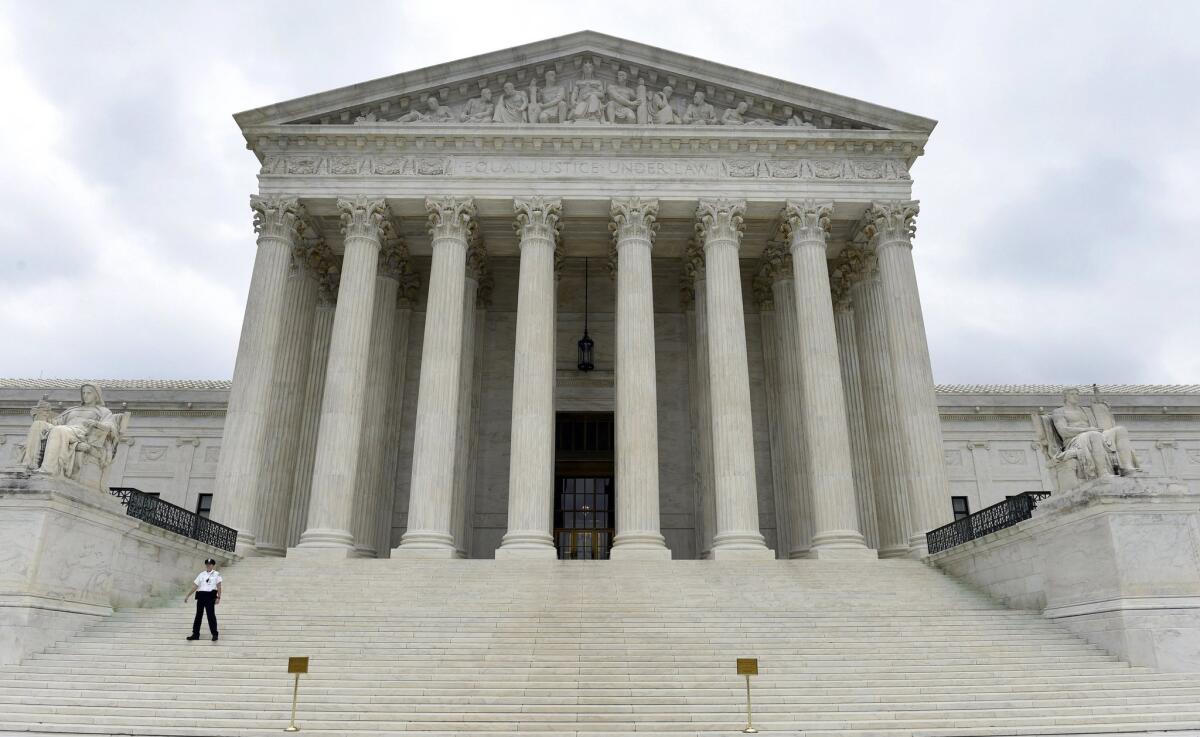Janitors at church schools aren’t ‘ministers,’ but what about math teachers? Coaches?

- Share via
Eight years ago, the Supreme Court ruled that religious organizations enjoy a “ministerial exception” from laws against employment discrimination, meaning that they may not be sued by employees or former employees who acted as “ministers” of the faith. That case involved a teacher fired by a Lutheran school that had classified her as a “commissioned minister.” The ruling was unanimous, uniting liberals and conservatives.
Based on Monday’s arguments in two follow-up cases — both involving teachers who lost their jobs at Catholic schools in Los Angeles — the consensus is about to fracture. But it’s less important that the court be unanimous than that it enunciate a clear statement of when courts should shield religious schools from employment-discrimination lawsuits.
If you listened to Monday’s oral arguments, you might despair of the court arriving at such a test. The justices and lawyers explored a dizzying variety of hypothetical situations aimed at testing which employees would qualify for the ministerial exception: Would a coach at a religious school be prevented from suing over his dismissal because he led the team in a prayer? What about a math teacher at a Jewish school who takes 20 seconds at the beginning of class to lead the students in saying the Shema (“Hear, O Israel: The Lord our God, the Lord is one”)?
But nothing in these hair-splitting scenarios prevents the court from coming to a common-sense conclusion.
In an editorial about these cases, the Los Angeles Times argued that “the court needs to insist that the ministerial exception doesn’t prohibit anti-discrimination lawsuits by employees of religious schools who aren’t responsible for imparting the faith — teachers who engage in no religious duties whatsoever as well as such employees as janitors, secretaries and food-service workers.”
At Monday’s argument, Eric C. Rassbach, the lawyer for the schools, conceded that some religious activity by an employee might be “de minimis” — legal Latin for “not a big deal.” He was responding to a question by Justice Elena Kagan about the math teacher. He had the same answer when Kagan asked him about an employee of a soup kitchen who distributes religious literature and leads grace before meals.
But Rassbach had a different answer when Kagan asked him about a nurse at a Catholic hospital who prays with sick patients. He said that “may well fall within the exception.” And, in response to a question from Justice Ruth Bader Ginsburg, e said that whether a coach would be covered by the exception would depend on “whether that particular person is performing [an] important religious function.”
Justice Neil M. Gorsuch worried about courts deciding which religious activities would put an employee into the “ministerial” category. He noted that the court had been wary of “entanglement” by the courts in religious judgments.
But as long as the 1st Amendment’s religion clauses remain in the Constitution, courts will have to draw lines and make distinctions. The Supreme Court’s goal in these cases should be not only to resolve the disputes before it but to also provide guidance for lower courts about how to handle similar conflicts, making future “do-overs” unnecessary or at least infrequent.
These cases involve a tension between two important interests: religious freedom — particularly the right of religious organizations to choose their leaders — and the enforcement of laws against discrimination in employment. In balancing those interests, the court can and should define more clearly who is and who is not covered by the ministerial exception.
Kagan drew this formula from the court’s 2012 decision: The ministerial exception applies to “people whose job it is to teach religion and to basically bring up the next generation in important understandings of religious doctrine and practice.”
That would seem to exclude from the ministerial exception the math teacher or coach who leads a brief prayer, but doesn’t teach religion, regularly lead students in worship or instruct students in the faith. (Everyone seems to agree that it would exclude the bus driver or janitor at a church school.)
No Supreme Court decision can anticipate every dispute that might arise in the future. But in these cases the court should endeavor to establish a clear rule about when the “ministerial exception” applies, even if clarity comes at the cost of unanimity.
More to Read
A cure for the common opinion
Get thought-provoking perspectives with our weekly newsletter.
You may occasionally receive promotional content from the Los Angeles Times.







